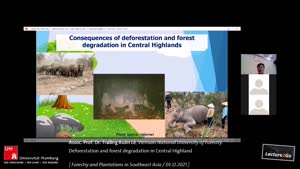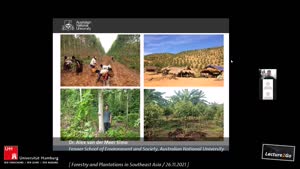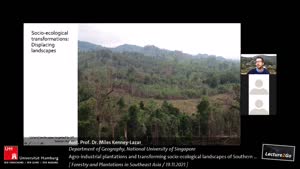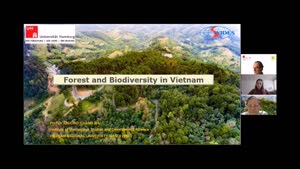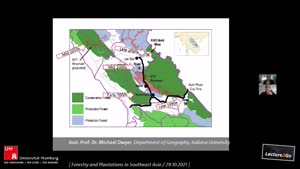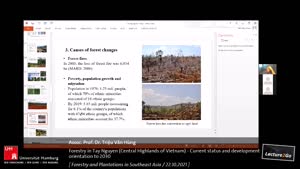Tree plantations and livelihoods - A comparative study of four forestry models in Lao PDR - Dr. Alex van der Meer Simo - Universität Hamburg
- Lecture2Go
- Videokatalog
- F.5 - Geisteswissenschaften
- Asien-Afrika-Institut
- Forestry and Plantations in Southeast Asia
Videokatalog
1632 Aufrufe
26.11.2021
Tree plantations and livelihoods - A comparative study of four forestry models in Lao PDR
Tree plantations are a growing and highly contested element of rural development in the global South. Most studies of large-scale plantations established under public land concession arrangements identify predominantly adverse impacts on local people’s livelihoods. More locally-responsive plantation models have been suggested as an alternative, in parallel with debate about what models of tree plantation are preferable for effective and equitable rural development, including in terms of their contribution to rural poverty alleviation. Possible models vary in terms of land tenure, stakeholders’ responsibilities in the establishment and management of the plantation, and integration with other land uses. Professional and advocacy paradigms often shape the discourses in favour or against each of these tree plantation models.
In this context, my research explored how four different models of tree plantation established for forest production in Lao PDR (Laos) contributed to the livelihoods of participating households in four purposely-selected villages. The case study tree plantation models comprised two forms of ‘land-sharing’ concessions for eucalypts (Eucalyptus hybrids), and one each of contract eucalypt growing and farmer-led agroforestry using yang bong (Persea kurzii).
My results showed that the contribution of plantations to livelihoods were positive where plantation models allowed for intercropping by households and when plantation companies offered more labour for local people. In contrast, where contracts to grow trees were not honoured, crops could not be grown jointly, and plantation labour opportunities were limited, returns to households were not competitive with alternative land uses, including traditional swidden agriculture. These results suggest that, in order to best contribute to livelihoods, tree plantation development should allow space for other land uses within the plantation system and adopt plantation management strategies that employ more local labour. The results also showed local people’s interests in maintaining diversified livelihood strategies.
Further, few previous studies and discussions of tree plantations in the Mekong region have situated the economic returns for plantation participants within the participants’ wider income portfolio. My results demonstrate that such empirical and analytical gaps in research on tree plantations need to be addressed if the case for policies to promote such plantations is to be evidence-based.
Alex van der Meer Simo describes himself as a socio-environmental conscious dad and an outcomes-driven professional with more than 20 years of work experience in the environmental sector with a strong focus on community-led ecological restoration. He has received his Ph.D. from the Fenner School of Environment and Society of the Australian National University and currently works as a postdoctoral research fellow there and at the Stockholm Environment Institute. At the same time, he works as a research officer at the Biosecurity and Social Science Program of the Australian Bureau of Agricultural and Resource Economics and Sciences. His recent publications include Livelihood Impacts of Plantation Forests on Farmers in the Greater Mekong Subregion: A Systematic Review of Plantation Forest Models, The role of agroforestry in swidden transitions: a case study in the context of customary land tenure in Central Lao PDR and Economic returns to households participating in different models of commercial tree plantations in Lao PDR.
---
“Forestry and Plantations in Southeast Asia (SEA)” is the topic of a two-semester series of classes. During the summer semester of 2021, the class has already covered insular SEA, especially Indonesia and the Philippines. In the fall-winter semester of 2021/22, the focus will be on continental SEA. Especially the Central Indochinese Highlands will be in the center of attention, and on the side of the three countries Vietnam, Laos and Cambodia. In recent decades, it is well known that so much natural forest area has been lost, so many hectares of plantations have been developed, starting in Vietnam, then spreading across the borders to Lower Laos and Northeastern Cambodia. The Vietnamese logging and plantation company Hoàng Anh Gia Lai is one prominent example. Similar processes occur in Northern Indochina as well, for instance along the Laos-China border. During the seminar and lecture series, we would like to raise some of the following questions, for example: How did deforestation happen, and how did the plantation industry grow - causes, processes, and consequences. How would forestry or ecology sciences, geography or sociology assess this matter? What could and should be to done to preserve the natural tropical rain forest? Are there are positive, effective methods to avoid the complete loss of natural tropical forests in the region of SEA, or is it doomed to disappear? The seminar includes a number of guest lectures from experts of the field who will give insights into the topic from different perspectives.
---
“Forestry and Plantations in Southeast Asia (SEA)” is the topic of a two-semester series of classes. During the summer semester of 2021, the class has already covered insular SEA, especially Indonesia and the Philippines. In the fall-winter semester of 2021/22, the focus will be on continental SEA. Especially the Central Indochinese Highlands will be in the center of attention, and on the side of the three countries Vietnam, Laos and Cambodia. In recent decades, it is well known that so much natural forest area has been lost, so many hectares of plantations have been developed, starting in Vietnam, then spreading across the borders to Lower Laos and Northeastern Cambodia. The Vietnamese logging and plantation company Hoàng Anh Gia Lai is one prominent example. Similar processes occur in Northern Indochina as well, for instance along the Laos-China border. During the seminar and lecture series, we would like to raise some of the following questions, for example: How did deforestation happen, and how did the plantation industry grow - causes, processes, and consequences. How would forestry or ecology sciences, geography or sociology assess this matter? What could and should be to done to preserve the natural tropical rain forest? Are there are positive, effective methods to avoid the complete loss of natural tropical forests in the region of SEA, or is it doomed to disappear? The seminar includes a number of guest lectures from experts of the field who will give insights into the topic from different perspectives.
Technischer Support
Bitte klicken Sie auf den nachfolgenden Link und füllen Sie daraufhin die notwendigen Felder aus, um unser Support-Team zu kontaktieren!
Link zu der RRZ-Support-Seite

